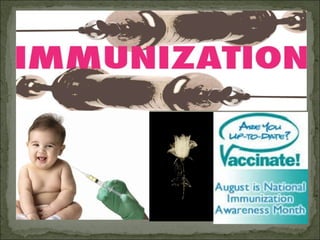Malaysian immunization
- 1. Ã˝
- 2. What isÃ˝immunization? ImmunizationÃ˝orÃ˝vaccinationÃ˝is theÃ˝vaccineÃ˝given to someone toÃ˝protect them from someÃ˝specificÃ˝diseases.Ã˝Antibodies from the motherÃ˝will giveÃ˝temporary shelterÃ˝for aboutÃ˝sixÃ˝months, theÃ˝babyÃ˝should beÃ˝protected fromÃ˝immuneÃ˝toÃ˝the disease. ImmunizationsÃ˝given toÃ˝childrenÃ˝and infantsÃ˝is the mostÃ˝effective andÃ˝cost-effectiveÃ˝to protect themÃ˝from theÃ˝diseaseÃ˝tuberculosis (TB), diphtheria,Ã˝pertussisÃ˝(whooping cough), tetanusÃ˝(tetanus),Ã˝poliomyelitis, measles,Ã˝rubellaÃ˝and hepatitisÃ˝B. HoweverÃ˝there are stillÃ˝children who areÃ˝notÃ˝immunizedÃ˝because ofÃ˝lack of knowledge aboutÃ˝vaccinesÃ˝andÃ˝immunization schedules,Ã˝misconceptionsÃ˝about the contraindications,Ã˝concernsÃ˝aboutÃ˝vaccineÃ˝side effectsÃ˝andÃ˝complications.
- 3. What isÃ˝active immunity? AcquiredÃ˝activeÃ˝immunityÃ˝by givingÃ˝the vaccineÃ˝by injectionÃ˝orÃ˝by mouth.Ã˝Examples of vaccineÃ˝consists of the following:Ã˝- (i)Ã˝"LiveÃ˝-Ã˝attenuatedÃ˝vaccines"Ã˝(liveÃ˝attenuatedÃ˝vaccine), such asÃ˝poliomyelitis vaccineÃ˝(OPV), measles,Ã˝rubellaÃ˝andÃ˝BCG. (ii)Ã˝"KilledÃ˝vaccines"Ã˝(deadÃ˝vaccine), such asÃ˝pertussisÃ˝andÃ˝inactivatedÃ˝poliomyelitis vaccineÃ˝(IPV). (iii)Ã˝'sub-unitÃ˝vaccine'Ã˝(subunitÃ˝vaccine), such asÃ˝PneumococcusÃ˝vaccine, hepatitisÃ˝B,influenza. (iv)Ã˝"Toxoid"Ã˝(toksoid)Ã˝such asÃ˝tetanusÃ˝diphtheriaÃ˝vaccine. Most vaccinesÃ˝protect againstÃ˝diseaseÃ˝by stimulatingÃ˝the immune systemÃ˝to produce antibodies.Ã˝BCG vaccineÃ˝provides protectionÃ˝byÃ˝immuneÃ˝cells (cellÃ˝mediated immunity).Ã˝ OPVÃ˝alsoÃ˝provideÃ˝localÃ˝immunityÃ˝(localÃ˝immunity)Ã˝in the intestinal tract.
- 4. What isÃ˝passiveÃ˝immunity? PassiveÃ˝immunityÃ˝is obtainedÃ˝by injectionÃ˝ofÃ˝humanÃ˝immunoglobulin.Ã˝Although the protection givenÃ˝is immediate,Ã˝butÃ˝it isÃ˝onlyÃ˝effectiveÃ˝forÃ˝a few weeks.Ã˝There areÃ˝two types ofÃ˝immunoglobulins, namely: (i)Ã˝"NormalÃ˝HumanÃ˝Immunoglobulin"Ã˝(HNIG)Ã˝obtained fromÃ˝plasmaÃ˝donorsÃ˝and contains antibodiesÃ˝against the virusÃ˝which is now inÃ˝the general population.Ã˝Example ofÃ˝use isÃ˝HNIGÃ˝grantÃ˝to childrenÃ˝lackedÃ˝immuneÃ˝(immunosuppressedÃ˝children)exposed toÃ˝measlesÃ˝if theyÃ˝have not beenÃ˝infected. (ii)Ã˝immunoglobulinÃ˝specific forÃ˝tetanus, hepatitisÃ˝B,Ã˝rabiesÃ˝andÃ˝varicellaÃ˝/Ã˝zoster(chicken pox).Ã˝ThisÃ˝immunoglobulin isÃ˝derivedÃ˝from bloodÃ˝donorsÃ˝who areÃ˝recovering fromÃ˝these diseases, bloodÃ˝donorsÃ˝immunizedÃ˝newÃ˝laws andÃ˝thoseÃ˝found to haveÃ˝high antibodyÃ˝levels.Ã˝ThusÃ˝eachÃ˝specificÃ˝immunoglobulinÃ˝containingÃ˝antibodiesÃ˝to higher levelsÃ˝thanÃ˝HNIG.Ã˝Instances whereÃ˝specificÃ˝immunoglobulinÃ˝usedÃ˝is the administration ofÃ˝"HepatitisÃ˝BÃ˝immunoglobulin"Ã˝(HBIG)Ã˝to theÃ˝newbornÃ˝ifÃ˝the mother isÃ˝HbsAg positive.
- 5. WhenÃ˝infantsÃ˝and childrenÃ˝should beÃ˝immunized? They wereÃ˝immunizedÃ˝according toÃ˝the Ministry of HealthÃ˝immunization schedule. (i)Ã˝Baby
- 6. (ii)Ã˝Children agedÃ˝1-4Ã˝years 1Ã˝¬ΩÃ˝-Ã˝2Ã˝years ofÃ˝additionalÃ˝doses ofÃ˝DPTÃ˝andÃ˝OPVÃ˝first
- 7. (iii)Ã˝School children Standard 1Ã˝-Ã˝DTÃ˝andÃ˝twoÃ˝additionalÃ˝doses ofÃ˝OPV BCGÃ˝(if noÃ˝scar) RubellaÃ˝(for girlsÃ˝only) Standard 6Ã˝-Ã˝BCG Form IIIÃ˝-Ã˝TetanusÃ˝Toxoid (iv)Ã˝mothers Beginning ofÃ˝the firstÃ˝dose ofÃ˝tetanusÃ˝ToksoidÃ˝during pregnancyÃ˝24-28Ã˝weeks (Kementerian KesihatanÃ˝promotesÃ˝toksoidÃ˝tetanusÃ˝given whenÃ˝pregnancyÃ˝confirmed)TetanusÃ˝ToxoidÃ˝secondÃ˝doseÃ˝6-8Ã˝weeks afterÃ˝the firstÃ˝dose ofÃ˝tetanusÃ˝toxoid ExtensionÃ˝OneÃ˝doseÃ˝of eachÃ˝pregnancy.
- 8. What are theÃ˝contraindicationsÃ˝toÃ˝immunization? 1) FeverÃ˝due toÃ˝seriousÃ˝illness.Ã˝DelayedÃ˝immunizationÃ˝only 2) ImmunodeficiencyÃ˝conditionsÃ˝areÃ˝contraindicationsÃ˝to theÃ˝"live-attenuatedÃ˝vaccines" only.Ã˝"KilledÃ˝vaccines"Ã˝can be given. ImmunodeficiencyÃ˝conditions, including: (i)Ã˝illness, inheritedÃ˝immunodeficiency (ii)Ã˝leukemia,Ã˝lymphoma,Ã˝Hodgkin'sÃ˝diseaseÃ˝and others.Ã˝ImmunizationÃ˝be deferred untilÃ˝6Ã˝months afterÃ˝treatmentÃ˝finished. (iii)Ã˝immunosuppressiveÃ˝treatmentÃ˝and radiation.Ã˝ImmunizationÃ˝be deferred untilÃ˝6months afterÃ˝treatmentÃ˝finished. (iv)Ã˝treatment withÃ˝corticosteroids such asÃ˝prednisoneÃ˝2Ã˝mgÃ˝/Ã˝kgÃ˝/ dayÃ˝for>Ã˝7Ã˝days orlow doseÃ˝/Ã˝moderateÃ˝every dayÃ˝for>Ã˝2 weeks.Ã˝ImmunizationÃ˝be deferred untilÃ˝3Ã˝months afterÃ˝treatmentÃ˝finished.Ã˝ChildrenÃ˝aregivenÃ˝a lowÃ˝doseÃ˝/Ã˝moderateÃ˝forÃ˝<2 weeksÃ˝and thoseÃ˝givenÃ˝a lowÃ˝doseÃ˝every other dayÃ˝forÃ˝longer periods of timeÃ˝canÃ˝be"live-attenuatedÃ˝vaccines.‚Äú InhaledÃ˝steroidsÃ˝areÃ˝notÃ˝contraindicated.
- 9. 3.Ã˝PregnancyÃ˝"live-attenuatedÃ˝vaccines"Ã˝should not be granted 4.Ã˝SpecificÃ˝contraindications: (i)Ã˝BCGÃ˝-Ã˝HIV infection isÃ˝aÃ˝bersimptomatik (ii)Ã˝HepatitisÃ˝BÃ˝-Ã˝There are noÃ˝contraindications (iii)Ã˝PertussisÃ˝- (a)Ã˝a progressiveÃ˝neurologicalÃ˝diseaseÃ˝such asÃ˝infantileÃ˝spasms (b)Ã˝in response toÃ˝earlierÃ˝doses, such as -Ã˝anaphylaxis -Ã˝TheÃ˝"shock" -Ã˝ConvulsionsÃ˝and feverÃ˝inÃ˝72 hours -Ã˝Fever>Ã˝40.5Ã˝CÃ˝withinÃ˝48 hours -Ã˝EncephalopathyÃ˝in 7 days
- 10. (iv)Ã˝DiphtheriaÃ˝-Ã˝noÃ˝contraindications (v)Ã˝TetanusÃ˝-Ã˝noÃ˝contraindications (vi)Ã˝PolioÃ˝-Ã˝diarrheaÃ˝(vaccineÃ˝given, butÃ˝this doseÃ˝is not counted.Ã˝The doseÃ˝should be repeatedÃ˝later) (vii)Ã˝RubellaÃ˝-Ã˝Pregnancy (viii)Ã˝MeaslesÃ˝(measles)Ã˝-Ã˝anaphylaxisÃ˝toÃ˝eggÃ˝protein
- 11. The followingÃ˝is not aÃ˝contraindicationÃ˝toÃ˝immunizationÃ˝ - LowÃ˝or moderateÃ˝feverÃ˝<38.5Ã˝CÃ˝due toÃ˝commonÃ˝illnessÃ˝such as coughs, coldsÃ˝and diarrhea - SkinÃ˝diseasesÃ˝likeÃ˝eczema,Ã˝boils andÃ˝ringworm - Low birth weight - Malnutrition - ProgressiveÃ˝neurologicalÃ˝diseaseÃ˝that is notÃ˝asÃ˝cerebralÃ˝palsy,Ã˝laterÃ˝developments,Ã˝a seizureÃ˝because of f ever,Ã˝seizuresÃ˝under controlÃ˝andÃ˝down syndrome. - Neonatal jaundice,Ã˝G6PDÃ˝deficiency - History ofÃ˝measlesÃ˝diseaseÃ˝withoutÃ˝serologicÃ˝evidence - Pregnant womenÃ˝(unless theÃ˝rubellaÃ˝vaccine)--- - HistoryÃ˝of miscarriageÃ˝inÃ˝pregnantÃ˝mothersÃ˝(ATT) - HIV (refer to theÃ˝BCG) - History ofÃ˝epilepsyÃ˝in the family - CongenitalÃ˝heartÃ˝disease *Ã˝Reference to theÃ˝doctorsÃ˝to makeÃ˝decisions aboutÃ˝immunizationÃ˝is recommended
- 12. What are theÃ˝complications ofÃ˝vaccination? ImmunisationÃ˝is safe, butÃ˝sometimesÃ˝there may beÃ˝someÃ˝complications.Ã˝LocalcomplicationsÃ˝such as swelling,Ã˝inflammation,Ã˝boils orÃ˝ulcersÃ˝at the injection siteshould be referred toÃ˝a doctor ifÃ˝serious. LowÃ˝feverÃ˝can be treated withÃ˝paracetamol, butÃ˝high fever,Ã˝cryingÃ˝non-stopÃ˝for more thanÃ˝two hoursÃ˝or any otherÃ˝neurologicalÃ˝symptomsÃ˝should be referredÃ˝to the hospital. IfÃ˝the occurrence ofÃ˝seizuresorÃ˝anaphylacticÃ˝reactions,Ã˝emergencyÃ˝ treatmentÃ˝should beÃ˝referred to the hospitalÃ˝before.
- 13. How does aÃ˝nurseÃ˝or doctorÃ˝can make sureÃ˝allÃ˝childrenÃ˝areÃ˝fullyÃ˝immunized? Each timeÃ˝a child isÃ˝being treated atÃ˝a clinic orÃ˝hospitalÃ˝immunizationÃ˝statusÃ˝should be reviewed.Ã˝IfÃ˝there are anyÃ˝that have not beenÃ˝grantedÃ˝immunity, he must beÃ˝immunized prior toÃ˝leaving theÃ˝clinic or hospital. AnyÃ˝decision to postponeÃ˝or notÃ˝immunizeÃ˝should be madeÃ˝afterÃ˝carefullyÃ˝considering theÃ˝consequencesÃ˝of our actionsÃ˝onÃ˝the child.Ã˝In this case,Ã˝a doctorÃ˝mustÃ˝provide a writtenÃ˝comprehensiveÃ˝immunization scheduleÃ˝forÃ˝children.
- 14. Ã˝














